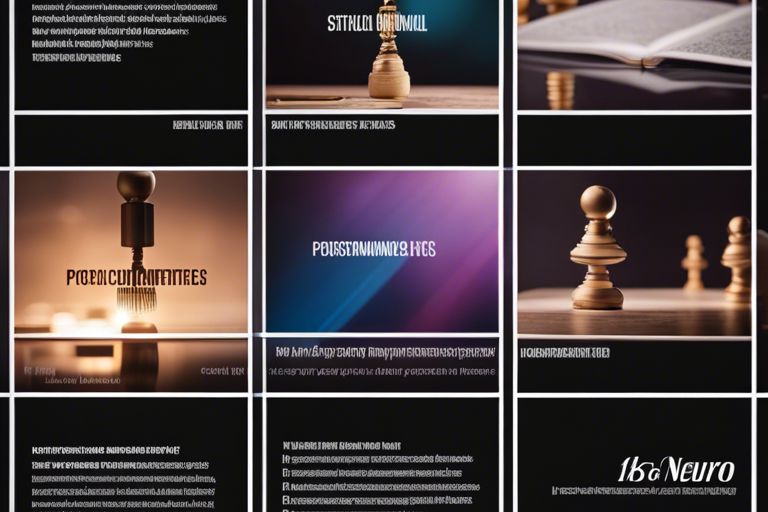Strategies are the backbone of any successful coaching practice, and understanding the power of Neuro-Linguistic Programming (NLP) can take your coaching game to the next level. In this insightful guide, we will explore into the top NLP strategies that every coach should have in their toolkit to drive transformation and achieve remarkable results with their clients. Let’s unlock the secrets to mastering communication, facilitating change, and creating lasting impact through the art of NLP.

Building Strong Foundations
Identifying Limiting Beliefs
Your coaching journey begins with identifying limiting beliefs that may be holding your clients back. Beliefs are the cornerstone of our thoughts, actions, and ultimately, our results. By helping clients uncover and understand their deeply ingrained beliefs, you can offer powerful insights to facilitate transformation.
Reframing Negative Self-Talk
On the path to personal growth, it’s crucial to address and reframe negative self-talk. Our inner dialogue shapes our reality, and by guiding clients to recognize and replace self-defeating thoughts with empowering ones, you can help them cultivate a more positive mindset and achieve their full potential.
Self-talk is a critical component of our mental landscape, influencing how we perceive ourselves and the world around us. By teaching clients to reframe negative self-talk, coaches can empower them to break free from self-imposed limitations and pave the way for lasting change and personal development.
Effective Communication Strategies
Active Listening Techniques
Even the most skilled coaches can benefit from honing their active listening techniques. Communication is more than just speaking; it involves truly understanding and empathizing with your clients. Active listening involves fully concentrating on what is being said rather than passively hearing the message. It requires techniques like paraphrasing, summarizing, and asking clarifying questions to ensure a deeper connection with your clients.
Mirroring and Matching for Rapport
Matching and mirroring are powerful tools to establish rapport with your clients. By subtly matching their body language, tone of voice, and even breathing patterns, you can create a sense of connection and trust. This technique helps in building rapport quickly and fostering a deeper level of understanding and communication with your clients.
Active listening is paramount in effective coaching relationships. It involves truly comprehending your client’s emotions, concerns, and aspirations. By practicing active listening techniques, such as reflecting content and feelings, maintaining eye contact, and withholding judgment, coaches can establish a safe and supportive environment for their clients to express themselves freely.
Advanced NLP Techniques for Coaches
It is crucial for coaches to have a repertoire of advanced NLP techniques to help their clients achieve transformative results. Here are some powerful strategies that can take coaching sessions to the next level:
- Anchoring for Emotional Regulation
- Using Metaphors for Deeper Insight
Anchoring for Emotional Regulation
With anchoring, coaches can help clients regulate their emotions by connecting specific stimuli to desired emotional states. By creating anchors through gestures, words, or touch, coaches can help clients access positive emotions like calmness or confidence in challenging situations.
Using Metaphors for Deeper Insight
The use of metaphors in coaching allows for a deeper exploration of underlying beliefs and perspectives. By framing personal experiences or challenges in the form of metaphors, coaches can facilitate new insights and understanding for clients. Metaphors provide a safe and creative space for clients to explore complex emotions and thoughts in a symbolic way.
Using metaphors in coaching sessions can unlock subconscious patterns and barriers, enabling clients to gain fresh perspectives and make meaningful changes in their lives. Coaches can guide clients to unravel the metaphorical meanings behind their experiences, leading to profound self-discovery and growth.
Putting it All Together
Unlike Top 10 NLP Techniques (Neuro-Linguistic Programming), which focuses on specific strategies, integrating NLP into coaching sessions requires a holistic approach that combines multiple techniques seamlessly.
Integrating NLP into Coaching Sessions
Any effective coach knows that weaving NLP techniques into their coaching sessions can lead to powerful transformations in their clients. By incorporating techniques such as mirroring, reframing, and anchoring, coaches can help clients overcome challenges and achieve their goals with greater ease.
Overcoming Common Challenges
Into the journey of integrating NLP into coaching, coaches may encounter common challenges such as client resistance or difficulty in implementing NLP techniques effectively.
For instance, coaches may find that some clients are skeptical of NLP or resistant to change, making it challenging to implement certain techniques. In such cases, coaches can use rapport-building skills and flexibility to adapt NLP strategies to suit the client’s needs and comfort level.
Conclusion
Conclusively, understanding the top NLP strategies is crucial for any coach looking to optimize their communication and coaching techniques. By leveraging these strategies, coaches can enhance their ability to connect with clients, facilitate positive change, and achieve impactful results. Embracing NLP can truly elevate a coach’s effectiveness and empower them to make a profound difference in the lives of those they work with.
FAQ
Q: What are the top NLP strategies every coach should know?
A: Coaches should be familiar with strategies like reframing, anchoring, rapport building, modeling, and mirroring to enhance communication and influence positively.
Q: How can reframing be used as an NLP strategy in coaching?
A: Reframing involves looking at a situation from a different perspective to shift one’s mindset. Coaches can help clients reframe challenges as opportunities for growth and learning.
Q: What is anchoring and how can it benefit coaching sessions?
A: Anchoring is a technique where a coach associates a specific stimulus with a desired emotional state. This can help clients access empowering emotions or resources during coaching sessions.
How does rapport building aid in effective coaching?
A: Rapport building establishes a connection of trust and understanding between a coach and client. This foundation is necessary for effective communication, collaboration, and progress in coaching sessions.
Q: What role does modeling play in NLP coaching strategies?
A: Modeling involves emulating the successful behaviors and strategies of others. Coaches can encourage clients to model behaviors of individuals who have achieved the outcomes they desire, leading to accelerated progress.



